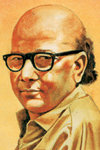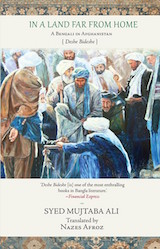 Birth— 1904-1974 Birth— 1904-1974
Where—Sylhet
Raised in—
Education— Al-Azhar University Cairo, Aligarh Muslim University
Currently—
Bibliography
-
Deshe Bideshe [1948]
-
Panchatantra [1952]
-
Obishashsho [1955]
-
Chacha Kahini [1955]
-
Mayurkanthi [1957]
-
Joley Dangay [1957]
-
Dhupchaya [1958]
-
Shabnam [1960]
-
Chaturanga [1960]
-
Sreshtho Golpo [1961]
-
Porosh Pathor [1962]
-
Bahubichitra [1962]
-
Bhoboghure O Onnanyo [1962]
-
Sreshtha Ramma Rochona [1962]
-
Tunimem [1964]
-
Duhara [1966]
-
Pachandashai [1967]
-
Shahriyar [1969]
-
Hitler [1970]
-
Kotona Asrujal [1971]
-
Musafir [1971]
-
Prem
-
Dandya Madhur
-
Tulanahina
-
Rajaujeer
|
Syed Mujtaba Ali (19.04-1974), was a renowned Bengali author, academician, scholar and linguist. He was born in Sunamganj, Sylhet in Bangladesh.
Education and early career
In 1919, Syed Mujtaba Ali was inspired by Rabindranath Tagore and started writing to the poet. In 1921, Mujtaba joined the Indian freedom struggle and left his school in Sylhet. He went to Visva-Bharati University in Santiniketan and graduated in 1926.He was the first graduate of the university. Later, he went to Kabul and worked in the education department (1927-1929). From 1929 to 1932 he studied at the universities in Berlin, London, Paris and Bonn, earning a PhD in comparative religious studies from the latter with a dissertation on the Khojas.
In 1934-1935 he studied at the Al-Azhar University in Cairo. Subsequently, he taught at colleges in Baroda (1936-1944) and Bogra (1949).
Language activism
After the Partition of India into India and Pakistan in 1947, Syed Mujtaba Ali went from India to the then East Pakistan, his motherland. He was a language activist and a supporter of Bengali as the national language of East Pakistan. In 1948, being the principal of Azizul Huq College, Bogra, he wrote an essay, ‘The State Language of East Pakistan’, which was printed in Chaturanga of Kolkata.
During that time, the West Pakistan Rulers tried to impose Urdu as the only state language of East Pakistan while Bengali was spoken by most of the people. The government of Pakistan wanted an explanation. Mujtaba Ali resigned and went to India.
Further career
After a brief stint at Calcutta University (1950), Mujtaba Ali became Secretary of the Indian Council for Cultural Relations and editor of its Arabic journal Thaqafatul Hind. From 1952 to 1956 he worked for All India Radio at New Delhi, Cuttack and Patna. Finally, he was professor at Visva-Bharati University (1956-1964).
Final years
After the liberation of Bangladesh, Syed Mujtaba Ali returned to his native land in 1972, where he died soon after.
Linguistic abilities
Ali knew French, German, Italian, Arabic, Persian, Urdu, Hindi, Sanskrit, Marathi, Gujarati, Pashtu, English and several dialects of Bengali.
Critic
In spite of being a student and follower of Rabindranath Tagore, he strictly opposed the prevalent thinking of the poet about pandits (or the rural teachers). Rabindranath had said,
“Pondo kore je, Pondit o! (A pandit is he who undoes).”
Ali’s response was,
“Rabindranath did not know about the conditions of Pandits in the era of Englishmen, otherwise he would have thought about that situation.”
Later, Syed Mujtaba Ali not only did criticize the great poet, but also had written a short story named Padotika, (The Asterisk), where he shows that a pandit’s monthly salary was one fourth of the cost for maintaining an Englishman’s pet dog.
Perhaps, the telling line in this tale is when the protagonist, (a pandit) asked for the solution to a simple math question, “Can anyone of my students tell me, my family’s eight members are equal to how many legs of the Englishman’s pet?”
Works
Extracts from Syed Mujtaba Ali’s literary works are included in the curriculum of school level, secondary, higher secondary and graduation level Bengali Literature in both Bangladesh and India, particularly in the states of West Bengal and Tripura.
 In a Land Far Away from Home: A Bengali in Afghanistan In a Land Far Away from Home: A Bengali in Afghanistan
Syed Mujtaba Ali
In 1927, a tumultuous time for Afghanistan as King Amanullah attempted comprehensive social reforms, an Indian teacher, Syed Mujtaba Ali, came to Kabul. His travelogue, “In A Land Far From Home”, published in India in 1948
|

 Birth— 1904-1974
Birth— 1904-1974 In a Land Far Away from Home: A Bengali in Afghanistan
In a Land Far Away from Home: A Bengali in Afghanistan